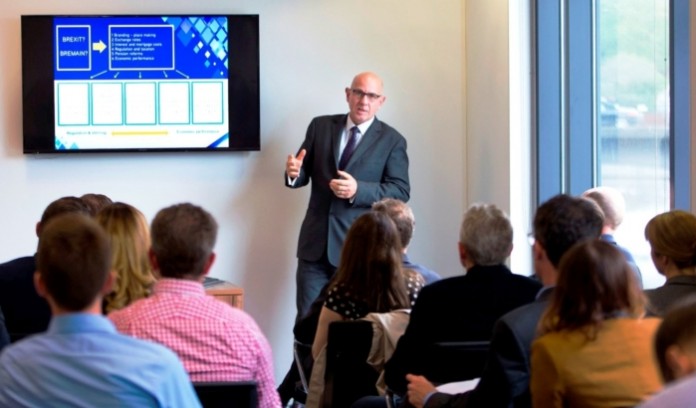A leading property economist has predicted to business leaders in Bristol that Britain will vote to remain in the European Union, and that this is likely to boost the regional economy of the West.
Walter Boettcher, chief economist at commercial property specialist Colliers International gave an economic perspective on the forthcoming EU referendum to guests at the company’s Bristol office in Temple Back and also visited the offices of companies including Clarke Willmott; BDO; Lloyds Bank; Veale Wasborough Vizards; RBS (Williams and Glynn), Change Real Estate; Foot Ansty and Osborne Clarke.
He said: “I don’t think the UK will vote to leave the EU. It may follow the Scottish referendum pattern, that is, a period of pre-referendum economic weakness followed by a ‘relief rally’, particularly across UK regional markets.”
He added: “If the UK votes to stay in Europe and our external relations are confirmed, then I expect to see the Government put renewed effort into internal regional devolution and push forward the regional development agenda as many local stakeholders are impatient for further movement.”
“A remain vote will enable the Chancellor, George Osborne, to step up to the plate and ensure that the West receives the level of commitment that has already benefitted the Northern Powerhouse.”
Dr Boettcher, who was accompanied by local director Simon Wells from Colliers’ Hotels Agency Team, was one of the few to publicly predict last year’s election outcome, declaring on video that there would be a landslide Conservative victory at a time when bookmakers and pundits were anticipating a Labour triumph.
He told Bristol business leaders: “The EU referendum on Thursday June 23rd is unlikely to result in a vote to leave. Instead, it is more likely to resemble the 1976 EU Referendum when two-thirds of voters chose to remain.”
When asked about the specific impact on UK property, he said he thought that a vote to leave would impact short-term investors far more than long-term investors.
“In the absence of a clear two to three year exit strategy, given great regulatory and market uncertainty, it is hard to see how a short-term investor could devise a clear plan,” he said.
“While this might drive out all but the most opportunistic investors, it would also drive out developers with otherwise sound strategies. There is already a great shortage of quality office and industrial expansion space UK wide. In Bristol, there has been considerable Grade B office rental growth in the absence of Grade A space.”
Dr Boettcher noted that there was wide spread belief that if Brexit took place, international companies who trade with the EU might move their operations out of the UK. He believed this might prove unfounded as firms who had carefully developed a skilled workforce would find it hard to walk away from the existing substantial pools of expertise that would be hard to replicate elsewhere. This was as relevant to high value-added manufacturing as to pharmaceutical research or financial services.
He said: “We might see some companies ‘brass plating’ and moving their head office out of the UK, but I don’t believe they will as in doing this they will be relocating key staff away from the work they are already doing in industries such as car production. Factories are not just for Christmas, you know!”
Dr Boettcher added that his greatest worry was that a vote to leave would fragment the UK Government at precisely the time it needed to be focussed and that he would rather see the next three to five year focussed on UK regional development rather than on reinventing UK foreign relations.






















